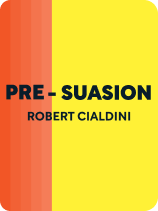

This article is an excerpt from the Shortform book guide to "Pre-Suasion" by Robert Cialdini. Shortform has the world's best summaries and analyses of books you should be reading.
Like this article? Sign up for a free trial here.
Have you ever wondered why we often defer to authority figures? What makes someone appear authoritative in the first place?
According to Robert Cialdini, authority is a crucial factor when it comes to influencing others. He reveals findings from fascinating experiments that show how our brains respond to perceived experts and why we’re inclined to follow their lead.
Read on to discover Robert Cialdini’s insights from his book Pre-Suasion and learn how to boost your own credibility in this eye-opening exploration of human behavior.
Robert Cialdini on Authority
According to Robert Cialdini, authority is a factor in pre-suasion. If you—the pre-suader—don’t come across as authoritative, other tools of influence you use might not matter. According to Cialdini, people naturally defer to those whom they perceive as authoritative, meaning that effective pre-suaders should attempt to underscore their own credibility.
(Shortform note: Although it’s natural to defer to authority, this deference can become a fallacy—namely, the “appeal to authority” fallacy—when we argue that something must be correct merely because an authority figure says so. For this reason, it’s best to take statements from authority figures as strong evidence, but not conclusive proof, that a statement is true.)
To illustrate the tendency to defer to authority, Cialdini discusses an experiment in which individuals were asked to answer complex questions about economics while undergoing a brain scan. He notes that when the participants were initially evaluating these questions, their brain activity surged in the area responsible for high-level problem-solving. However, when these participants heard proposed answers from professional economists, their brain activity crashed as they mindlessly deferred to the expert.
| How Much Power Do Authority Figures Really Have Over Us? The well-known “Milgram Shock experiment,” run by psychologist Stanley Milgram, further illustrates the extent to which individuals defer to authority. Rather than measuring how this deference shows up in the brain, he measured its impact on behavior. Milgram told participants that they’d serve the role of a “teacher” whose job was to administer electric shocks to a “student” (who was actually an actor pretending to be shocked) whenever the student answered a question incorrectly. After each shock, the experimenter (who was the authority figure) told the participants to increase the voltage by 15 volts. Milgram reports that 65% of participants ultimately increased the voltage all the way to the maximum level of 450 volts—a level that would have posed serious threats to the learner’s safety—just because the authority figure told them to do so. |
Cialdini concludes that making our own authority salient can be a winning strategy for pre-suasion. To do so, he recommends that you establish your credibility by admitting a shortcoming early in conversation, since people perceive those who are candid about their weaknesses as more credible. For instance, if you’re a politician on the campaign trail, confessing to previous mistakes—say, support for an unsuccessful bill in years past—could actually make you seem more authoritative in the eyes of your constituents.
(Shortform note: Psychologists have found that in addition to making you more credible, a display of weakness can also make you more likable. For example, in one study, participants watched a recording of an individual taking a verbal quiz and answering 92% of the questions correctly. However, half of the participants watched a version in which the individual spilled coffee on himself at the end of the quiz, while the other half watched a video without the spilled coffee. The study found that participants who watched him spill coffee on himself rated him as considerably more likable afterwards, compared to those who didn’t watch him spill coffee on himself.)

———End of Preview———
Like what you just read? Read the rest of the world's best book summary and analysis of Robert Cialdini's "Pre-Suasion" at Shortform.
Here's what you'll find in our full Pre-Suasion summary:
- The moment when people are particularly susceptible to influence
- The first step you should take when you want to persuade someone
- Why a brilliant argument isn’t enough to convince some people






